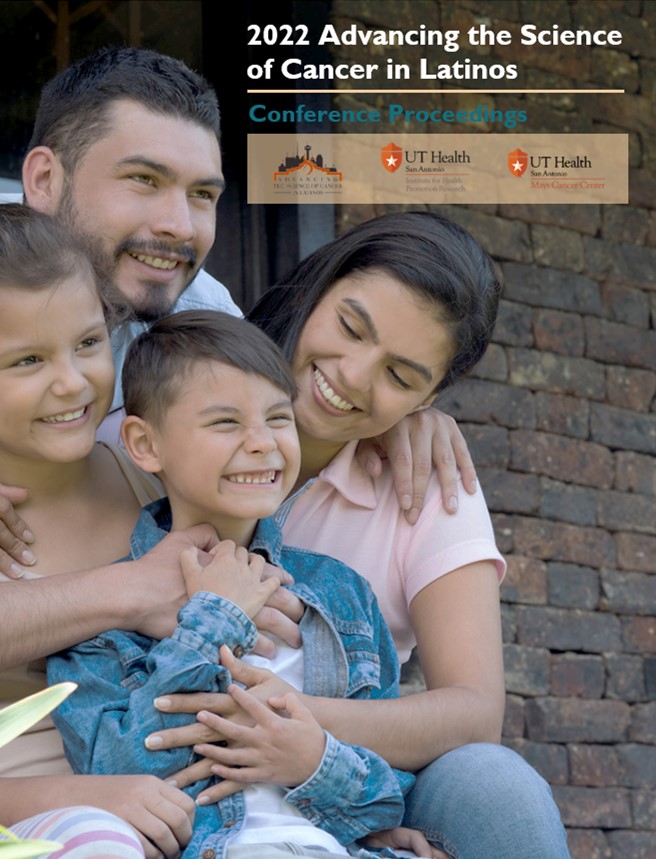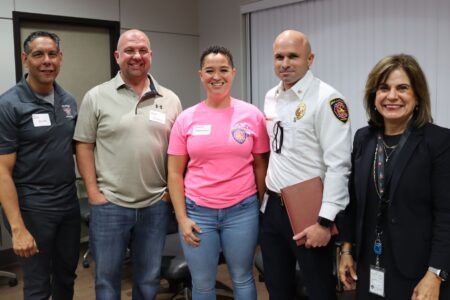
Share On Social!
In the next few years, Latinos face a 142% rise in cancer rates.
Latinos also experience cancer differently — from genetics to healthcare access to survivorship.
 That’s why Dr. Amelie Ramirez, director of Salud America! and the Institute for Health Promotion Research at UT Health San Antonio, partnered with the Mays Cancer Center to create the Advancing the Science of Cancer in Latinos (ASCL) biennial conference. Read the proceedings from the 2018 and 2020 ASCL Conferences.
That’s why Dr. Amelie Ramirez, director of Salud America! and the Institute for Health Promotion Research at UT Health San Antonio, partnered with the Mays Cancer Center to create the Advancing the Science of Cancer in Latinos (ASCL) biennial conference. Read the proceedings from the 2018 and 2020 ASCL Conferences.
The 2022 ASCL Conference on Feb. 23-25, 2022, in San Antonio, Texas, welcomed over 250 prominent researchers, physicians, healthcare professionals, patient supporters, and students from across the globe to address cancer health differences among Latinos. Conference sponsors included major supporters Genentech and Bristol Myers Squibb; contributors Gilead Sciences and Novartis; donors Adaptive, Pfizer, and AstraZeneca; and exhibitors Caris, Pfizer, AstraZeneca, Sobi NA, Texas Society of Clinical Oncology, Regeneron, Genentech, Bristol Myers Squibb, Bayer, Immudex, National Alliance for Hispanic Health, and Merck & Co. Inc.
2022 ASCL Conference speakers and attendees discussed Latino healthcare differences, cancer challenges across the cancer care continuum, and much more.
The following “Advancing the Science of Cancer in Latinos: 2022 Conference Proceedings” summarizes findings of Latino leaders in the areas of cancer research, healthcare differences, COVID policy, clinical trial challenges, international cooperation, community intervention, end-of-life care, and social intervention. The information presented, however, merely represents a beginning, with the hope that dialog and collaboration will continue, providing new solutions for the elimination of health differences among Latino populations.
Quick Link
Full PDF of the 2022 Advancing the Science of Cancer in Latinos Conference Proceedings (PDF)
Introduction
The United States healthcare system is rife with differences and challenges affecting the Latino community.
Section 1: Addressing Challenges Behind Cancer Differences
- Addressing Differences and Background to Advance Health Improvement for Latinos, Dr. Marcella Nunez-Smith
- Paying Respects and Con Respeto: Economic Considerations of Community-driven Interventions, Dr. Yamilé Molina
- Two Tales, One Goal: Equity, Dr. Narjust Duma
- Obesity Through the Cancer Continuum: Current Evidence and Guidelines for Cancer Prevention and Control, Dr. Elisa Bandera
- Genetic Ancestry, BMI and Tumor Genomic Alterations Among Latino – Increasing Data Complexity, Dr. Lorna Rodriguez-Rodriguez
- Obesity and Severe Obesity: Opportunities for Background-Based Cancer Risk Reduction in Latinos, Dr. Lisa Sanchez-Johnsen
- Neighborhoods, Obesity and Cancer Among Latinos, Dr. Carola T. Sánchez Díaz
Section 2: The State of Latino Cancer Policy and Support
- Effective Latino Cancer Policy Requires Effective Legislative Support, Dr. Jaime Estrada
- The State of Policy Support in Latino Cancer, Dr. Rogelio Sáenz
Section 3: Latino Cancer Research Methodology
- Framing Latino Cancer Research and the Census Bureau Data That Enable It, Mr. Robert L. Santos
- Why Structure Matters, Dr. Robert A. Winn
- Advancing breast and liver cancer research in Mexico, Dr. Martin Lajous
- FIPOL: An International Effort to Support Latino Psycho-Oncology Research and Capacity Building, Dr. Rosario Costas-Muñiz
- Achievements of the Latin American Cancer Research Network (LACRN) and Lessons Learned: Notes to Improve Cancer Science in Latin America, Dr. Andrea Llera
Section 4: The Impact of COVID-19 on Cancer Care
- COVID-19 Past, Present and Future, Dr. Carlos Del Rio
- The Impact of COVID-19 among Latinos and NIH Initiatives to Advance Health Improvement, Dr. Monica Webb Hooper
- The Impact of COVID-19 Among Pediatric Oncology Patients, Dr. Terrie Flatt
Section 5: Tackling Specific Cancer Differences
- Updates in Genomics of Breast Cancer among Latina Women, Dr. Elad Ziv
- Updates and Trends in Breast Cancer Treatment: Advancing the Science of Cancer in Latinos, Dr. Filipa Lynce
- The Landscape of Breast Cancer Genetics in Puerto Rico, Dr. Julie Dutil
- Lung Cancer in Latinos: Differences Across the Continuum of Care, Dr. M. Patricia Rivera
- Targeting Tumor Microenvironments in Lung Cancer, Dr. Josephine Taverna
- Lung Cancer Drivers in Hispanic/Latinos, Dr. W. Douglas Cress
- Feasibility and Acceptability of Adapted Survivorship Care Virtual GMVs for Spanish-Speaking Latinas with Breast Cancer in a Setting, Dr. Ana I. Velazquez
- Non-Medical Drivers of Health Impact on Gastric Cancer Risk, Dr. Dorothy Long Parma
- Cardiometabolic Comorbidities in Hispanic/Latino Cancer Survivors: Prevalence and Impact on Health-Related Quality of Life and Supportive Care Needs, Dr. Ashley Maras
- Background Differences in Family Caregiver Support in End-of-Life Cancer Care, Dr. Paul Maciejewski
- Gastrointestinal Cancers in Latinos: Recent Trends and Emerging Risk Factors, Dr. V. Wendy Setiawan
Section 6: Cancer Screening Differences
- Cancer Screening in Puerto Rico Challenges and Opportunities to Address Health Differences, Dr. Guillermo Tortolero-Luna
- Practice Transformation to Improve Cancer Screening Outcomes at an Academic Medical Center, Dr. Rebecca Jones
Section 7: Cancer Clinical Trials
- Novel Therapeutic Approach to Reduce Health Differences in B-cell Acute Lymphoblastic Leukemia in Hispanic/Latino Children, Dr. Sinisa Dovat
- Overcoming Differences in Cancer Care: The Importance of Clinical Trials, Dr. Gladys I. Rodriguez
- Developing Cancer Drugs for All: A Regulatory Perspective, Dr. Lola Fashoyin-Aje
- What We Don’t Know Might Hurt Us: The Impact of Limited Participation in Cancer Clinical Trials, Dr. Jose Trevino
Section 8: Latino Cancer Survivorship
- Leading Pathways: The Hispanic/Latino Survivorship Study, Dr. Frank Penedo
- Differences in Cancer Care: Loriana’s Story, Loriana Hernandez-Aldama
- Differences in Cancer Care: Daniel’s Story, Daniel G. Garza
- The Therapeutic Alliance and End-of-life Care Differences for Latino Cancer Patients, Dr. Ana I. Tergas
Section 9: The Industry Role in Cancer Research Innovation
- Transformative Strategies for Integration of Health Improvement Principles in Science and Access in the US, Dr. Edith A. Perez
- Advancing Precision Medicine Through Comprehensive Molecular Profiling, Dr. Yashira Negrón Abril
- How BMS is Addressing the Need for Greater Involvement in Clinical Trials, Lorena Kuri
- Increasing Access to Cancer Screening: Working with Latino Communities in Texas, Dr. Michael del Aguila
- Increasing Participation in Clinical Research, Dr. Veronica Sandoval
Section 10: Latino Cancer Research Resources
- Using Science to Address Latino Health Differences Research, Dr. Eliseo J. Pérez-Stable
- Update from the National Cancer Institute, Dr. Katrina Goddard
- Cancer Epidemiology in Hispanic Populations: Overview, Future Directions, and Resources, Dr. Tram Kim Lam
- Optimizing Patient-Clinician Communication for Hispanic/Latino Persons with Cancer through Open Notes and the 21st Century Cures Act, Dr. Carli Zegers
Conclusions and Recommendations
To eliminate cancer differences in Latino populations, the 2022 Advancing the Science of Cancer in Latinos conference brought together researchers, scientists, physicians, healthcare professionals, patient supporters, and students from across the US and Latin America. These presenters shared research advancements, identified gaps, developed actionable goals, updated clinical best practices, described effective community interventions, and detailed professional training programs aimed at addressing differences. In the process, most of the speakers made recommendations, either specific to their field of study or more broadly. The following are some key recommendations abstracted from their conference presentations.
About the Authors
- Amelie G. Ramirez, DrPH, Director, Salud America!, Professor, Institute for Health Promotion Research, UT Health San Antonio
- Sarah C. Nicholson, PhD, Lead Medical Writer, SCN Medical Communications
- David Jones, Associate Medical Writer, SCN Medical Communications
This report is copyright 2023 Salud America! at UT Health San Antonio.
By The Numbers
142
Percent
Expected rise in Latino cancer cases in coming years



